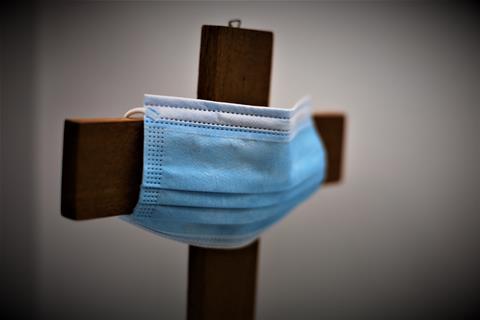Restrictions may be coming to an end but 66 per cent of British people still think masks should be worn indoors. And while some Christians are celebrating a return to congregational singing from Sunday 25 July, others are more cautious. As church leaders face tough decisions on what to allow in their services, Liam Thatcher explains why ‘personal choice’ is a double-edged sword

Sitting in a coffee shop yesterday – a novelty with which I am slowly and gratefully getting reacquainted – I overheard two people discussing the announcement that mask-wearing will soon be made a ‘personal choice.’ The conversation went like this:
Person A: “As soon as that happens, I’m burning my masks! Can’t wait to get rid of them!”
Person B: “Don’t you think you should keep one? You might need it sometimes?”
Person A: “Nah, I’m never wearing one again. Why would anyone do anything that they don’t have to do?”
I found that a fascinating question, the simple answer to which is that everyone does many things they don’t have to. Nobody forced that chap to sip a latte and read the paper. Nobody is saying we have to watch the England game, own a mobile phone or eat that second biscuit. No legal body has declared that we must brush our teeth twice daily or change our underwear. We do a million things we don’t have to.
The question is really, ‘why would anyone do anything that they don’t have to and don’t want to?’
A double-edged sword
‘Personal choice’ is a double-edged sword, because with personal choice comes personal responsibility. For months now, people have been lamenting the restrictions we’ve faced because of Covid-19, and longing for them to come to an end. At times, we’ve all questioned the logic behind the restrictions, the seemingly haphazard or downright contradictory nature of some of them, and we’ve complained about choices being made for us and enforced upon us. But, come July 19, many of the choices will be ours and, where we have been armchair politicians for so long, believing we could have made better choices… well, that’s going to be put to the test. Personal choice requires personal reasoning - and not everyone is going to agree with the decisions we make.
True freedom, like love, is costly and complex
I’m not sure that we’re well-equipped to handle personal choice because most of us operate as individualists, thinking of ourselves first and foremost. But personal choice is rarely ‘personal’ in the sense that it rarely affects only ourselves. Our choices have ramifications for others around us. Your choice to wear or not wear a mask does not only affect you but also the people who fear being in the same shop as you, on the same bus as you, in the same church service as you. Whether or not their fears are scientifically rooted, it is clear that our personal choices have public consequences.
Personal choice vs public opinion
A YouGov poll found that 71 per cent of British people think face masks should continue to be mandatory on public transport for a further period of time and 66 per cent think they should be mandatory in shops and enclosed spaces. So what do we do when our personal choice goes against public opinion? Even if some people are convinced mask-wearing has no scientific effect, it certainly has an effect on people’s sense of safety and wellbeing. Surely that counts for something?
Personal choice has public ramifications. One person’s expression of freedom limits the freedom of those around them. The irony is that the person who burns his mask in celebration of the fact that he is no longer bound by the decisions of others is, in fact, binding others to the consequences of his decisions.
If we use our freedom for self-serving reasons, then we are not honouring God
So it’s about to get messier. We’re all politicians now. At least in the original sense of the word, where the Greek politeia had to do with reflecting on how ‘the good’ should be worked out in society, our relationships and communities. And sadly many of us are idiots, at least in the sense that some have used the word, taking idiotes to mean ‘one who lives as a private individual, with little care for, or participation in, public life’!
What about church?
It’s been interesting watching this play out for churches. For months, many leaders have been complaining about the fact that we’ve not been permitted to sing in our services. We’ve questioned the science, talked theology and pointed out the inconsistencies between the hugging, singing crowds in stadia and pubs and the silenced, distanced crowds in our churches. And now many of the same people who tweeted ‘let us sing’ are tweeting that, come Sunday 25th July, they may choose not to sing - for the good of those in our gatherings who feel uncomfortable.
Personal choice creates a whole mass of challenges, because freedom to also includes freedom not to, and the things we choose not to do also have public consequences. The question for church leaders is not just whether we should sing, it’s whether we should make mask-wearing optional or keep it mandatory, reduce social distancing or maintain it, allow singing at all, allow it only for those wearing masks or leave it to personal choice, bring back refreshments, practice communion with a shared cup, offer prayer with hands laid on… and so on. And with all of this we have the challenge of knowing how much to speak about, justify, or enforce our decisions so that people’s personal boundaries aren’t violated and they don’t feel pressured into interactions with which they are not comfortable, or judged for avoiding them.
As church leaders try to balance their own personal, theological and practical convictions with those of a diverse community and a watching world, it’s not obvious what we should - or shouldn’t - do. Many within congregations will complain that their leaders are moving too fast and creating an unsafe space that they are not comfortable being in. And their concerns may be valid and legitimate. Many others will complain that their leaders are moving too slowly and limiting the potential of what Church could and should be by not reintroducing singing, refreshments etc. And their concerns may be valid and legitimate.
Living in freedom
These are difficult questions to which there are no easy answers but, because of the wisdom of Scripture and the example of Christ, Christians should be better-equipped to grapple with them than many. Our Bible tells us that the Church is a body, where the weaker parts are indispensable; if one part suffers, the whole suffers (1 Corinthians 12:12-31). It tells us that in a diverse community where people’s differing faith levels allow them to participate in different ways, we must not judge one another and we must not put stumbling blocks before one another, but the stronger brother should restrain himself for the good of the weaker brother (Romans 14). It tells us that for the sake of mission we might choose to adapt our approach in order to reach people unlike us, restricting our ‘freedom’ for the good of others – to the weak we become weak – becoming all things to all people, so that by all means we may save some (1 Corinthians 9:19-23).
The apostle Peter writes: “Live as free people, but do not use your freedom as a cover-up for evil; live as God’s slaves” (1 Peter 2:16). This instruction recognises that there is a way of using your freedom which is actually a way of masking evil intentions (pun semi-intended!) If we use our freedom for self-serving reasons, either neglecting or causing harm to others in the process, then we are misusing our freedom and not honouring God. Whereas if we submit our freedom to a greater goal, namely service to God, then, in that self-imposed limitation, we find a truer, deeper freedom.
This is something we see most clearly embodied in the person of Jesus. He did not consider his freedom something to be used for his own advantage, but at the cross embraced the ultimate restriction of death in order to bring life to others. He is our model. As Peter goes on to say: “To this you were called, because Christ suffered for you, leaving you an example, that you should follow in his steps” (1 Peter 2:21).
True freedom
So, why would anyone do anything that they don’t have to do? Quite simply, out of love. Out of care for those around us, we should all – Christians especially – be willing to do things we don’t have to and don’t even want to do. And we should also be willing to not do things we would like to, if self-imposed limitation will be best for the Kingdom. That is true freedom.
None of which answers the question of whether or not we should keep wearing masks beyond July 19, or whether we should sing, or do many of the other things we long to do in Church. I don’t think there are universal answers to those questions, and within a multi-site church like I’m part of, I could make a case for taking different decisions for each venue based on the complex balance of logistics, demographic and the needs of the community.
But despite the trickiness, there is beauty in complex questions and grey areas, because it forces us to develop an ethical agility that observes, adapts and responds to the needs of others and the prompts of the Spirit. We cannot treat these as hypothetical questions to be pondered in an abstract way. We have to look one another in the eyes, discover how people genuinely feel and learn to adapt our own preferences for the good of others.
David Foster Wallace wrote: “The really important kind of freedom involves attention, and awareness, and discipline, and effort, and being able truly to care about other people and to sacrifice for them, over and over, in myriad petty little unsexy ways, every day.”
True freedom is harder work than being told what to do, and it wouldn’t surprise me if some who had vocally longed for the days of restrictions to end may look back to those days with wistfulness! True freedom, like love, is costly and complex, sometimes messy, but always worth the investment.
This article was first published on liamthatcher.com and is re-used with permission



































